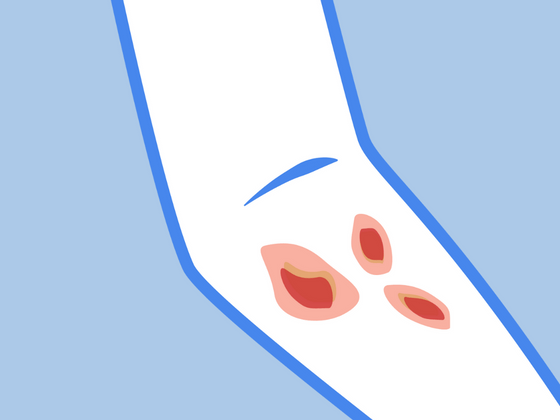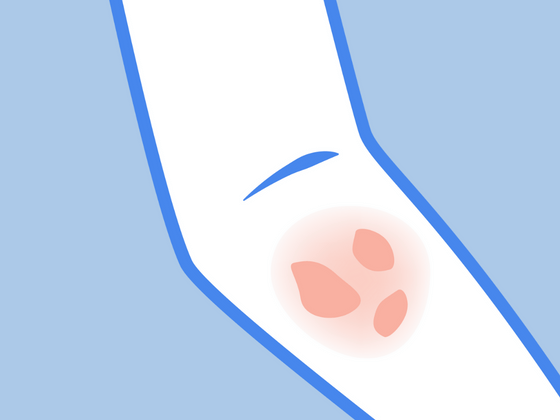Eczema, also known as atopic dermatitis, is a chronic skin condition that causes dryness, itching, and inflammation. Believing they can improve eczema symptoms, many people turn to probiotics to support their gut health. However, some individuals report flare-ups after taking probiotics, raising the question: can probiotics make eczema worse?
In this blog, we're going to explore:
-
The connection between the gut microbiome and eczema
-
How different probiotic strains may impact eczema symptoms
-
Factors that determine whether probiotics help or worsen eczema
Keep reading to understand how probiotics influence skin health and whether you should use them for treating eczema.
The Gut-Skin Connection and Eczema
The gut and skin are closely linked through the gut-skin axis, meaning that gut microbiota changes can influence skin health. Research suggests that an imbalance in gut bacteria, known as gut dysbiosis, may contribute to skin barrier dysfunction and systemic inflammation, both of which are common in atopic eczema.
Probiotics are often used to restore a healthy balance of gut bacteria, strengthening the intestinal barrier function and improving the body's immune response. However, the relationship between probiotics and eczema is complex, as different probiotic strains can affect the immune system and skin microbiome differently.
Can Probiotics Make Eczema Worse?
While many studies suggest that probiotics may help prevent eczema and reduce eczema symptoms, there is some evidence that they can trigger flare-ups in certain individuals. Here's why:
1. Strain-Specific Effects
Not all probiotic bacteria work the same way. Some strains, such as Lactobacillus acidophilus, may help reduce systemic inflammation, while others may overstimulate the immune system, worsening skin conditions like contact dermatitis or seborrheic dermatitis. Randomized controlled trials have shown that the effects of probiotics vary depending on the individual and the specific strain used.
2. Temporary Symptoms Due to Gut Adjustment
When introducing probiotic supplements or fermented foods, some people experience digestive discomfort as their gut microbiome adjusts. This can lead to bloating, gas, and increased histamine production, which may aggravate allergic disorders and worsen dry skin or nummular eczema.
3. Pre-Existing Food Allergies
Individuals with food allergies may react to probiotic foods such as yogurt, kefir, or miso. A randomized clinical trial found that some people with atopic dermatitis experienced flare-ups after consuming dairy-based probiotics due to an allergic reaction, highlighting the need for caution when choosing probiotic sources.
How Probiotics Can Help Treat Eczema
On the other hand, if you're looking for a natural way to improve your eczema symptoms, probiotics may be a great addition to your routine. Here's why:
1. They Strengthen the Gut-Skin Connection
The gut-skin axis plays a key role in keeping your skin healthy. By introducing probiotic supplementation, you can support your digestive health and reduce the systemic inflammation that contributes to eczema flare-ups.
2. They Rebuild a Healthy Microbiome
A thriving gut microbiota helps your body fight off harmful bacteria and maintain a strong intestinal barrier function. This, in turn, protects the skin from irritation, dryness, and inflammation – common issues for those with atopic eczema – which can lead to an improved quality of life.
3. They Support a Balanced Immune System
Eczema is often linked to allergic disorders and an overactive immune response. Probiotics help modulate the immune system, reducing the likelihood of flare-ups caused by environmental factors, psychological stress, or food allergies.
How to Use Probiotics for Eczema
Healing your gut doesn't have to be complicated. Here are some simple ways to naturally support your gut microbiome and improve your skin:
Eat More Probiotic Foods
Add fermented foods like kimchi, sauerkraut, and dairy-free yogurt to your diet to nourish your gut with healthy bacteria.
Incorporate Prebiotics
Foods like bananas, onions, and garlic feed beneficial bacteria, helping probiotics work more effectively.
Stay Consistent
Just like any eczema treatment, probiotic supplementation takes time. Give your body a few weeks to adjust and track any changes in your skin symptoms.
Support Your Skin Microbiome Topically
In addition to nourishing your gut, you can also support a healthy microbiome directly on your skin. Our Nourish + Hydrate Manuka Balm is enriched with lactobacillus ferment, a probiotic extract that helps balance skin bacteria and reduce flare-ups. Combined with UMF®-certified Manuka honey, sunflower oil, and camellia seed oil, this soothing balm strengthens the skin barrier, locks in hydration, and calms irritation, making it an ideal companion to internal probiotic care for eczema.
When Probiotics May Help Treat Eczema
Some factors that determine whether probiotics help include:
-
Age and Eczema Type: Probiotic treatment may be more effective in infants and children than in the adult population with chronic eczema.
-
Combination with Prebiotics: Prebiotic foods, which feed beneficial bacteria, can enhance the effects of probiotics by promoting a healthy microbiome.
-
Clinical Evidence and Personal Response: A blood test or allergy screening can help identify whether probiotics are likely to benefit or worsen skin symptoms.
Support Your Skin from the Inside Out
Managing eczema involves understanding how gut health, immune function, and environmental factors influence your skin. While some people benefit from probiotic supplementation, others may experience worsened skin symptoms. By paying attention to your body's response, choosing the right probiotic strains, and supporting your digestive system with a balanced diet, you can make informed decisions about your eczema treatment.








